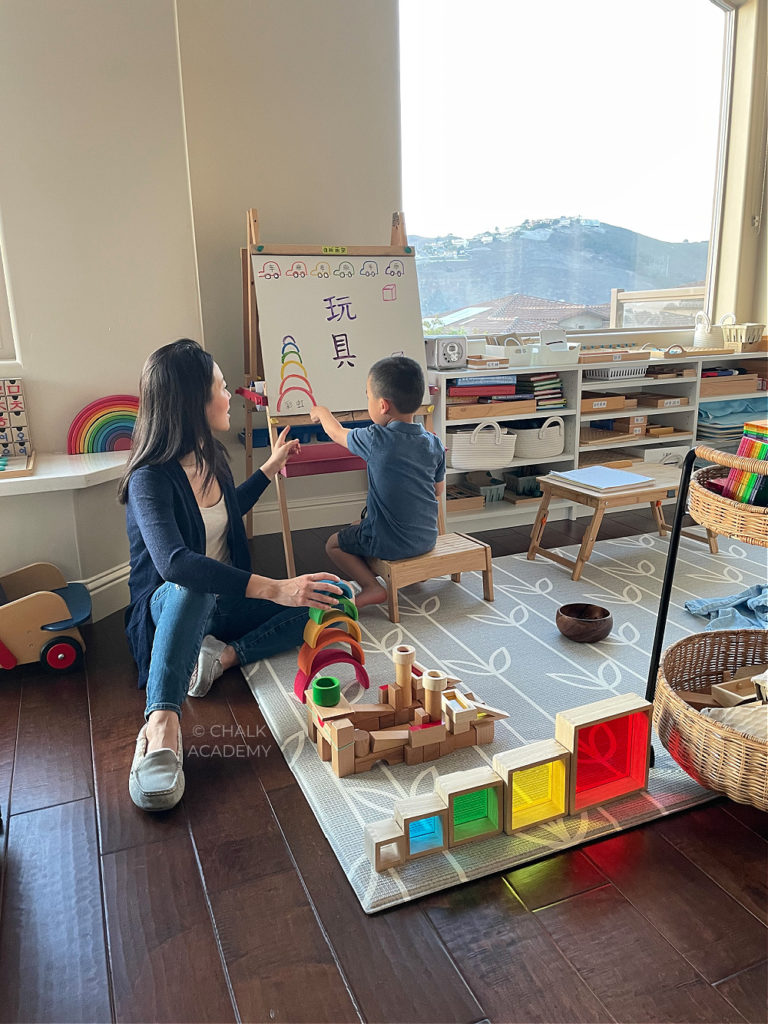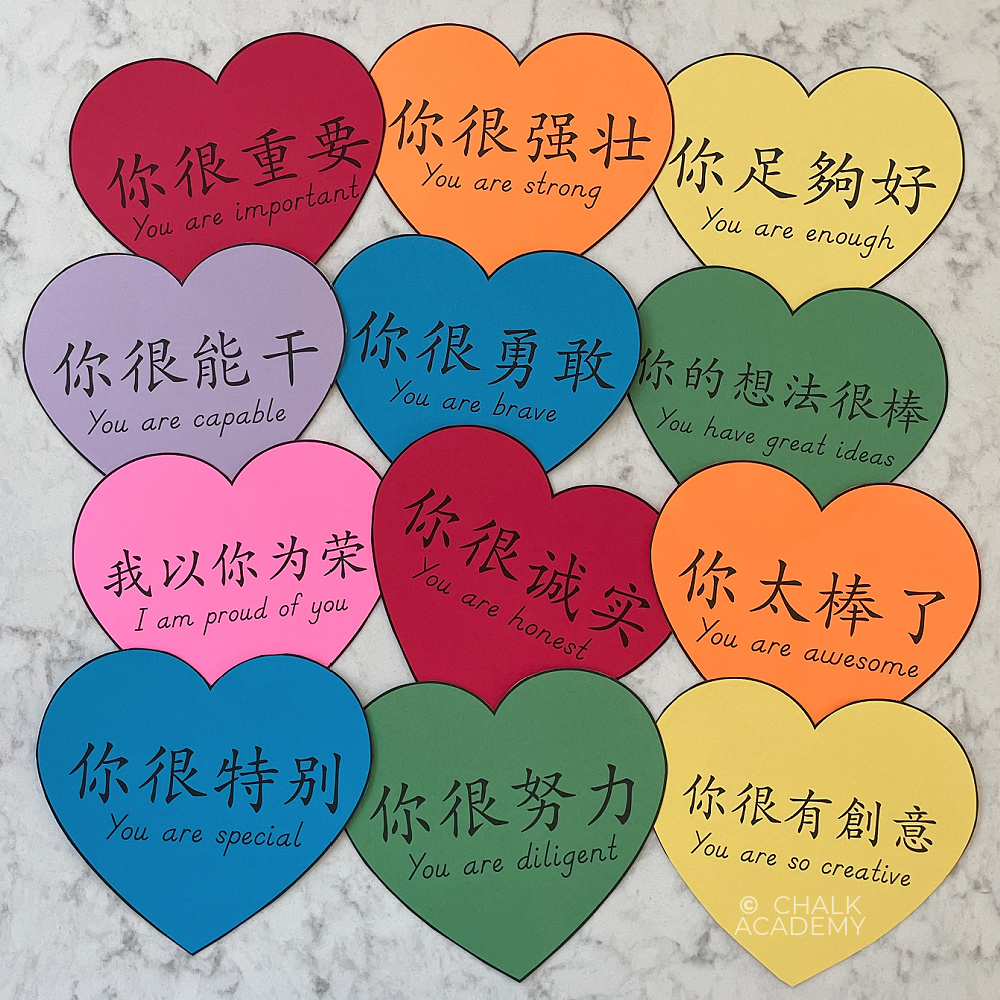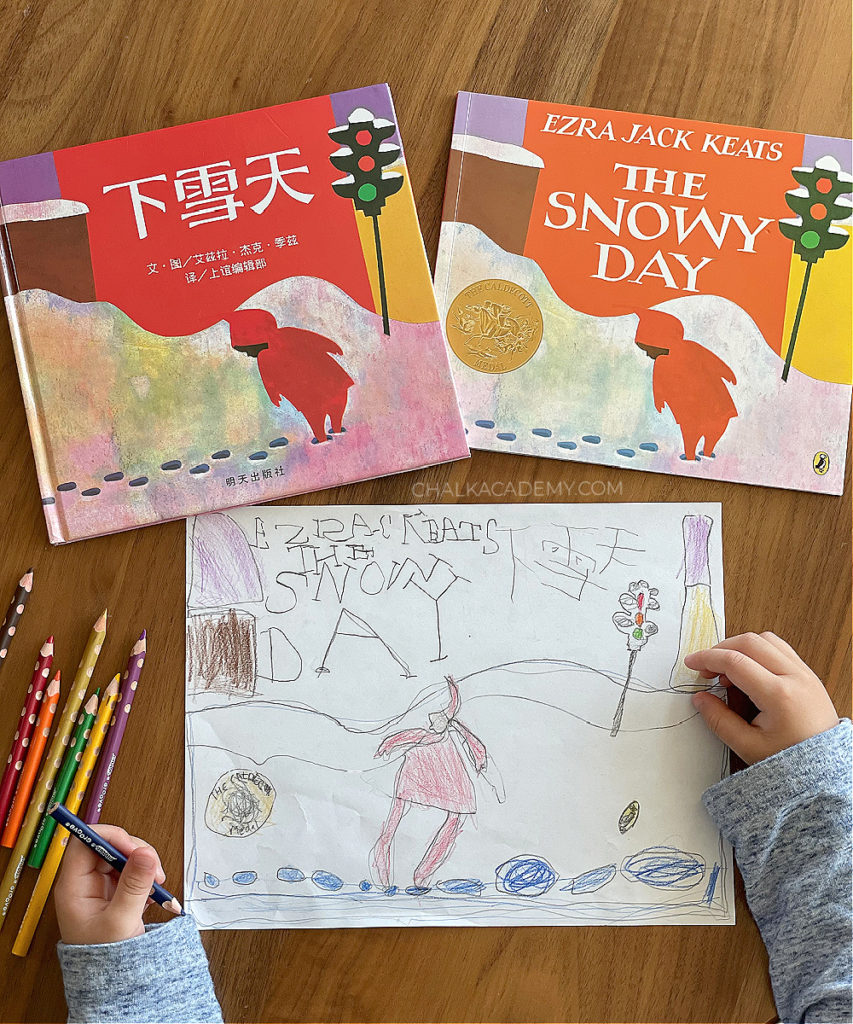Effective Praising Words for Kids Instead of “Good Job” (Chinese and English)

“Good job” is a simple and easy phrase that comes out of our mouths without even thinking. But this phrasing has a problem: it focuses on the end result rather than how we got there. Effective praise differs in that it focuses on the effort taken rather than the product or accomplishment itself. To help us avoid “good job,” I will share our list of praising words for kids.
Effective praise takes practice, but the effort is worthwhile for our children. Knowing how to praise can be challenging if all you heard was “good job” or constant criticism from your own parents and teachers. Since we’re trying to raise bilingual kids, we want to give better feedback in both Chinese and English.

Praise in Asian culture versus Western culture
In traditional Asian culture, ability-based comments are the norm. For example, my daughter’s former piano teacher would start each lesson with, “Let’s see if you’re smart today! 让我们看看你今天聪明不聪明 / 讓我們看看你今天聰明不聰明。” At the end of class, she would tell me, “Today, she was smart and learned quickly. 今天她很聪明,学得很快。/ 今天她很聰明,學得很快。”
On the other hand, I have been guilty of showering my kids with excessive amounts of “good job.” While I’ve been trained to provide constructive feedback in work settings, I didn’t realize I was mindlessly praising my kids until I watched videos of our interactions. Subconsciously, I may have gone overboard to make up for the lack of praise I got during my childhood. So I knew I had to practice to make my praise more meaningful.
Chalk Academy is reader-supported. Some of the links are affiliate links. When you buy something through an affiliate link, we may earn a very small commission at no additional cost to you. More details here.
While I quickly learned how to give timely and useful praise to my children in English, I needed help with Chinese translations since I’m still learning this language. I’ll share encouraging bilingual phrases that we try to use every day. I hope they can help your family and school! Printables are included at the end of this post.
More positive parenting resources
- Natural Ways to Improve Communication Skills Through Play
- 7 Tips for Tackling Big Challenges Like Bilingual Parenting
Benefits of praising kids
In contrast to criticism and punishment, research shows that praise has long-term power to:
- Foster positive relationships
- Boost confidence
- Encourage self-reflection
- Reinforce desired behavior
- Improve academic performance
- Help overcome challenges
These potential benefits depend on the type of praise and how it’s used to cultivate motivation and connection.
Three types of praise
In general, praise falls into 3 categories. Here are examples with potential benefits and drawbacks.
Personal praise
Personal praise focuses on a child’s skills and abilities, such as “You’re so smart 你很聪明 / 你很聰明”. Often, it’s used as a way to compare a child with other people.
What’s wrong with personal praise?
Scientific American reports that “more than 3 decades of research shows that an overemphasis on intellect or talent—and the implication that such traits are innate and fixed—leaves people vulnerable to failure, fearful of challenges and unmotivated to learn.”
The American Psychological Association agrees that heavy focus on intelligence can have “serious negative consequences for learning.” Other examples of such comments include:
- Ability-based praise: This homework is easy for you. 这些作业对你来说很容易 / 這些作業對您來說很容易。(Zhèxiē zuòyè duì ní lái shuō hěn róngyì.)
- Excessive compliments
- Wow. You are truly amazing! 哇。你真的是非常了不起! (Wa. Nǐ zhēn de shì fēicháng liǎobùqǐ!)
- You are a genius. 你是个天才 / 你是個天才。(Nǐ shìgè tiāncái.)
- Comparison with others:
- You’re the smartest student in the class! 你是班上最聪明的学生!你是班上最聰明的學生!(Ní shì bān shàng zuì cōngmíng de xuéshēng!)
- You’re smarter than your friends. 你比朋友聪明 / 你比朋友聰明。(Nǐ bǐ péngyǒu cōngmíng.)
While this can provide temporary encouragement, a child who frequently hears this type of praise may feel that a specific outcome (eg, perfection, being the best) is desired. In addition, personal praise may imply that the skill is rooted in natural talent rather than something that can improve.
Plus, there is so much more to our kids than their intellect and natural talent! It’s important to focus on other aspects of their personality, such as their curiosity and the way they treat other people.
Effort-based praise
Effort-based praise focuses on observations of actions that children can control. Instead of “You cat drawing is perfect and looks so real!”, you can say “I noticed you spent a lot of time drawing the cat.” Through effort-based praise, the child hears that the time spent on drawing was noteworthy. In other words, regardless of whether the child scribbled or painted a life-like cat, the emphasis is on the process.
Behavior-specific praise
By praising specific behavior, your child learns exactly which actions are desirable. So if your child is usually loud but draws quietly, you can praise them for working quietly and how it impacted other people nearby.

Ways to make praising a child more effective
Of the 3 types of praise, psychology experts recommend focusing on effort and behavior rather than personal skills. Before dishing out compliments to our kids, we should consider the goals we hope to achieve with our words.
In order for praise to become empowering, we can cultivate a growth mindset by reinforcing effort and behavior with careful thought. Strategies include:
- Observing your child and pausing to think before commenting. Even if you are proud of your child, if he or she is focused and not seeking your attention, talking can disrupt your child’s concentration and momentum.
- Being specific about what you notice and appreciate. General comments are too vague and abstract.
- Modeling to your child how you reflect on your effort and work. Encourage your child to participate as well.
- Connecting behavior to outcomes. Note how certain actions have positive and negative consequences.
- Avoiding overpraising. Praising every little action can backfire as a child can grow to rely on external motivation. They may wonder if something is wrong when they aren’t praised.
What’s wrong with “good job?”
“Good job” is not exactly bad per se, but the phrase by itself is vague at best. Other common generic remarks include:
- Nice work. 做得好。(Zuò dé hǎo.)
- That’s great! 那太棒了!(Nà tài bàngle!)
- Not bad. 很不错 / 很不錯。(Hěn bùcuò.)
Instead, this phrase can be paired or replaced with specific feedback. What exactly is “good?” What do you like about whatever you are responding to?
If you are able to take pause and observe what your child is doing, you’ll be able to notice their effects and articulate what you see to them.
20 Empowering praising words for kids you can try in Chinese and English
Observational comments in Chinese and English
Oftentimes, our kids are not necessarily seeking praise but simply our undivided attention. The following statements are examples of sharing objective observations, so our kids hear that we noticed them.
- You made most of it by yourself!
- 大部分是你自己做的!
- Dà bùfèn shì nǐ zìjǐ zuò de!
- You did _____ and then you finished!
- 您做了_____,然后完成了!
- 您做了_____,然後完成了!
- Nín zuòle, ránhòu wánchéngle!
- You ate your vegetables!
- 你吃了蔬菜!
- Nǐ chīle shūcài!
- You washed your hands!
- 你洗了手!
- Nǐ xǐle shǒu!
- You read the book!
- 你看完书了!
- 你看完書了!
- Nǐ kàn wán shūle!
Try this: 15 Ways to Encourage Your Child to Read
Effort and behavior-based praising words for kids in Chinese and English
The following phrases can help reinforce that our children’s efforts and ideas are useful!
- You were very focused!
- 你很专心!
- 你很專心!
- Nǐ hěn zhuānxīn!
- You worked very hard!
- 你很努力!
- Nǐ hěn nǔlì!
- _______ is an awesome idea!
- _________是个很棒的主意!
- _________是個很棒的主意!
- _________shìgè hěn bàng de zhǔyì!
- Very organized!
- 很有组织能力!
- 很有組織能力!
- Hěn yǒu zǔzhī nénglì!
- Though it was difficult, you were patient.
- 虽然很难, 但你很有耐心。
- 雖然很難, 但你很有耐心。
- Suīrán hěn nán, dàn nǐ hěn yǒu nàixīn.
Related: “Grace Said” Focus, Patience, Persistence Chinese Picture Books
Praising words for kids with gratitude in Chinese and English
Showing appreciation for our children is a wonderful way to validate their actions.
- Thank you for doing ________, now we can…
- 谢谢您这样做……现在我们可以做…..
- 謝謝您這樣做……現在我們可以做…..
- Xièxiè nín zhèyàng zuò……xiànzài wǒmen kěyǐ zuò…..
- I appreciate_____.
- 我感谢_____.
- 我感謝_____.
- Wǒ gǎnxiè_____.
- Thanks for your help!
- 谢谢你的帮助!
- 謝謝你的幫助!
- Xièxiè nǐ de bāngzhù!
Praising words for kids that encourage introspection in Chinese and English
Ultimately, we want our children to be intrinsically motivated rather than reliant on external incentives. Questions about their work can help cultivate self-reflection.
- How did you do that?
- 你是怎么做到的?
- 你是怎麼做到的?
- Nǐ shì zěnme zuò dào de?
- How did you think of that?
- 你是怎么想到的?
- 你是怎麼想到的?
- Nǐ shì zěnme xiǎngdào de?
- How do you feel?
- 你觉得如何?
- 你覺得如何?
- Nǐ juédé rúhé?
- What do you think about it?
- 你觉得怎么样?
- 你覺得怎麼樣?
- Nǐ juédé zěnme yàng?
- Can you tell me a little more about this?
- 再告诉我多一些细节,好吗?
- 再告訴我多一些細節,好嗎?
- Zài gàosù wǒ duō yīxiē xìjié, hǎo ma?
- After you finish this, what will you do?
- 完成后, 你会做什么?
- 完成後,你會做什麼?
- Wánchéng hòu, nǐ huì zuò shénme?
- What is your favorite part about this?
- 你最喜欢的部分是什么?
- 你最喜歡的部分是什麼?
- Nǐ zuì xǐhuān de bùfèn shì shénme?
- Anything else you can share with me?
- 还有什么可以告诉我呢?
- 還有什麼可以告訴我呢?
- Hái yǒu shé me kěyǐ gàosù wǒ ne?
Note: Observe how your child reacts to questions. Some children may feel like they are getting quizzed on the spot. They may need grown-ups to model answering these types of questions.
Try This: How A Dictation Journal Improves Speaking, Reading, and Writing (VIDEO)
Examples of feedback and praising a child in common scenarios
Scenario 1: Artwork
A child wants to share his/her drawing. Possible responses:
- What did you draw?
- 你画了什么?
- 你畫了什麼?
- Nǐ huàle shénme?
- Why did you draw this?
- 你为什么画这个呢?
- 你為什麼畫這個?
- Nǐ wèishéme huà zhège?
- What colors did you use?
- 你用了什么颜色?
- 你用了什麼顏色?
- Nǐ yòngle shénme yánsè?
- What is your favorite part about it?
- 你最喜欢的部分是什么?
- 你最喜歡的部分是什麼?
- Nǐ zuì xǐhuān de bùfèn shì shénme?
- Very creative!
- 很有创意!
- 很有創意!
- Hěn yǒu chuàngyì!
- Thank you for showing me!
- 谢谢你给我看!
- 謝謝你給我看!
- Xièxiè nǐ gěi wǒ kàn!
Try this: Kids Art Cart, Storage System, and Organization Tips
Scenario 2: Cleaning/organizing
A child puts away toys. Possible responses:
- Thanks for putting away the toys!
- 谢谢你把玩具收起来。
- 謝謝你把玩具收起來。
- Xièxiè bǎ wánjù shōu qǐlái.
- The room is tidy, because you put away the toys.
- 房间很整洁,因为你把玩具收好了。
- 房間很整潔,因為你把玩具收好了。
- Fángjiān hěn zhěngjié, yīnwèi nǐ bǎ wánjù shōu hǎole.
- The floor is clean, so it’s very safe. We won’t trip over toys.
- 地板干净时,很安全。 我们不会给地上的玩具绊倒。
- 地板乾淨時,很安全。我們不會給地上的玩具絆倒。
- Dìbǎn gānjìng shí, hěn ānquán. Wǒmen bù huì gěi dìshàng de wánjù bàn dào.
- I appreciate your help!
- 我感谢你的帮助!
- 我感謝你的幫助!
- Wǒ gǎnxiè ní de bāngzhù!
Try this: Play Area / Homeschool Room Before and After: 11 Tips for Decluttering
Download examples of effective praising words for kids in Chinese and English
Please review the Terms & Conditions before downloading any materials. ©2023 CHALK ACADEMY. Do not share any files without permission from chalkacademy.com. Only this website link may be shared.
Here are printable alternatives to “Good Job!” that you can put on your refrigerator or stick on your nightstand for practice!
- English, Simplified Chinese, Traditional Chinese, and Pinyin
- English, Traditional Chinese, and Zhuyin
What other words do you use to praise your kids in Chinese and English?
What was your personal experience with praise in your childhood? Have you noticed how your children respond to different types of praise? What has been most effective?
If you have any suggestions for translations and other encouraging phrases to add, please share in the comments below! We’d love to learn from your family!
More positive affirmations for our children

- 30 Positive Affirmations to Tell Our Kids Everyday (English / Chinese Printable)
- Surprise Your Kids with These Positive Heart Messages!
